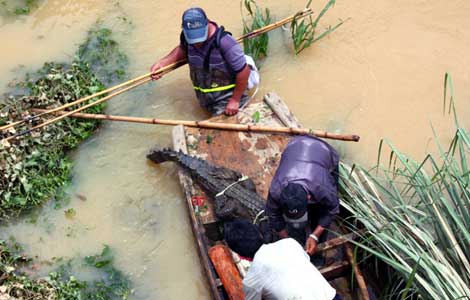New study reveals corruption pattern
Updated: 2013-08-22 08:02
By Tang Yue, Zhang Yuchen and Wu Wencong (China Daily)
|
|||||||||
|
TOP 10 EXAMPLES of corruption 1. Illegally helping others to acquire documents or qualifications, such as permanent residence permits for Hong Kong or Macao or permits for logging. 2. Practicing favoritism, such as helping companies win contracts for multimillion-yuan contracts, awarding contracts for the operating rights of expressways to companies offering unreasonably low tenders, or helping companies become national procurement suppliers. 3. Helping businesses to obtain illegal loans, engaging in illegal fundraising, or using public funds to provide financial aid to companies 4. Illegally helping others to acquire land or real estate, such as helping companies handle land acquisition procedures illegally, letting companies buy or exploit land at a very low price, obtaining demolition compensation for unqualified parties. 5. Illegally helping others to run companies in violation of laws and regulations. This includes forging documents to successfully launch, restructure or list a company, or illegally helping companies to acquire State-owned shares. Aiding companies to issue shares illegally and using undue influence to resolve raw material supply problems or financial disputes. 6. Illegally helping others to obtain promotion, retain their posts, transfer to new jobs or be hired. 7. Aiding and abetting crimes, such as covering up illegal behavior, aiding the illegal import and export of goods or interfering in the judicial process. 8. Embezzlement and misappropriation of public funds, such as buying bonds through State loans and misappropriating the interest, false accounting, using fictional projects to obtain State funds, or misappropriating expensive gifts. 9. Abusing power by supporting and condoning illegal actions, arbitrary introduction of projects from overseas, and severely damaging to State assets. 10. Striking "power and sex" deals, such as bankrolling financially dependent lovers or committing bigamy. Wu Wencong |
Jealousy or peer pressure is a major psychological factor. The corrupt officials - although they were high-quality appointees, very intelligent and enjoyed high social status - were far less wealthy than well-off businesspeople, which caused an imbalance in their psyches. Usually, they simply followed suit and accepted bribes because their peers did. Some elderly officials regarded it as unjust that they worked hard, but failed to benefit from their positions. They were intent on taking anything they could get before they retired.
What was the influence of the family on the crimes of corrupt officials?
Most were either aided or spurred on by their families when they became involved in bribery, embezzlement or graft.
In the 1980s, there were only two cases of corruption, and family members were not involved in either. During the 1990s, out of 15 cases, three were found to involve a relative. Since 2000, however, about 36 percent of corruption cases have involved family members.
Sometimes under the guise of business, family members have exploited their connections with officials for personal gain. Some acted as middlemen, providing a link between businesses and officials in key positions. They provided illegal aid to projects, programs or plans from which they hoped to benefit financially or socially.
While, some officials wouldn't accept the bribes themselves, close relatives, usually their spouses or children, would play the role of an agent and collect the bribe on their behalf. As beneficiaries, the offspring of corrupt officials usually accepted financial support that enabled them to study overseas.
Did illicit love affairs also play an important role?
In some cases, the illicit lovers of corrupt officials were heavily involved. They either committed crimes along with the officials or prompted them to do so. Many officials had more than one lover simultaneously.
The lovers of officials can be categorized this way: as subordinates; as staff members or executives of companies and enterprises in need of help from the official; as models or TV presenters; as staff members at hotels; and people in the service industry.
Is it possible to prevent high-level officials from engaging in corrupt acts, and what lessons can be gleaned from analysis of these 103 cases?
Don't "rocket promote" officials. Do it step by step, and adhere to the laws governing the promotion and training of officials. Before an official is promoted or removed from office, the supervisory authorities should conduct thorough financial checks on the official, their families and their range of responsibilities.
Declaration of assets is crucial to solving this problem. Officials and their families should be subject to full disclosure of their financial situations, including the businesses in which they have interests, their bank status, property portfolios, investments, education and employment histories.
A complete surveillance should be conducted by specially empowered authorities. Information essential to public scrutiny should be publicized in the work unit, but also through the mass media. Public monitoring is very helpful in maintaining a system based on integrity.
Contact the writers at tangyue@chinadaily.com.cn and zhangyuchen@chinadaily.com.cn

 Manning gets 35 years in WikiLeaks trial
Manning gets 35 years in WikiLeaks trial
 At least 37 killed in Malaysian bus crash
At least 37 killed in Malaysian bus crash
 FM calls for closer Cambodia relations
FM calls for closer Cambodia relations Problems for rural kids in cities
Problems for rural kids in cities
 Search for escaped crocodiles continues
Search for escaped crocodiles continues
 Police break up baby trafficking ring
Police break up baby trafficking ring
 Jeremy Lin celebrates birthday in basketball clinic
Jeremy Lin celebrates birthday in basketball clinic
 Police identify suspect in US school shooting
Police identify suspect in US school shooting
Most Viewed
Editor's Picks

|

|

|

|

|

|
Today's Top News
Bo Xilai stands trial for bribery, embezzlement
Manning gets 35 years in WikiLeaks trial
Chinese workers detained in Russia
US spying raises tensions with China
Wildlife plan struck with Kenya
Egypt court orders Mubarak's release
China to leapfrog US in oil imports
Flooding may get worse
US Weekly

|

|








